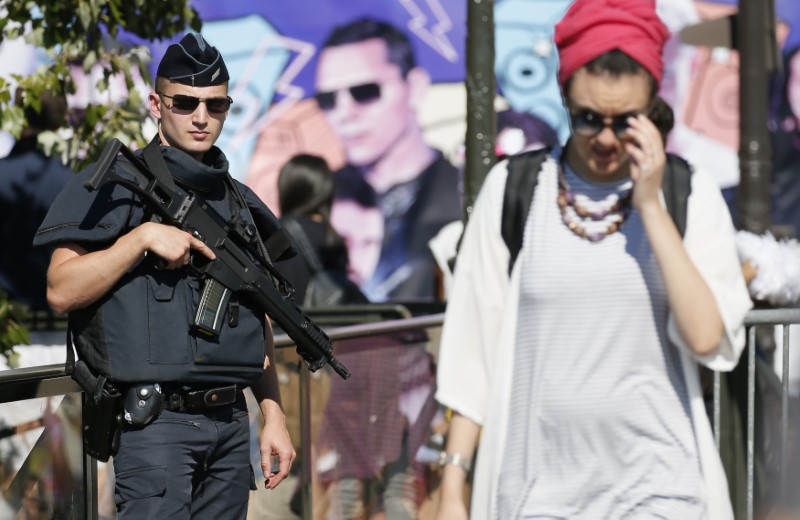
By Mica Rosenberg
(Reuters) – U.S. immigration authorities are arresting Iraqi immigrants ordered deported for serious crimes, the U.S. government said on Monday, after Iraq agreed to accept U.S. deportees as part of a deal to remove it from President Donald Trump’s travel ban.
“As a result of recent negotiations between the U.S. and Iraq, Iraq has recently agreed to accept a number of Iraqi nationals subject to orders of removal,” said Gillian Christensen, a spokeswoman for U.S. Immigration and Customs Enforcement.
Christensen said the agency recently arrested a number of individuals, all of whom had criminal convictions for violations ranging from homicide to drug charges and had been ordered removed by an immigration judge. She declined to give more details, citing the ongoing nature of the operation.
Trump has said more countries need to take back nationals ordered deported from the United States and has pledged to increase immigration enforcement.
Al-Hamza Al-Jamaly, the attache at the Iraqi Embassy in Washington said Iraqi diplomatic and consular missions would coordinate with U.S. authorities to issue travel documents for the deportees “that we can prove to be ‘Iraqi’ based on our records and investigation.”
Attorneys, activists and family members told Reuters that ICE officials had arrested dozens of people in the Chaldean Catholic community in Detroit, Michigan and Kurdish Iraqis in Nashville, Tennessee over the weekend and last week.
Many in the communities have been in the United States for decades and were blindsided by the roundups.
Reuters could not independently confirm all of the cases.
The moves come after the U.S. government dropped Iraq from a list of countries targeted by a revised version of Trump’s temporary travel ban issued in March.
The March 6 order said Iraq was taken off the list because the Iraqi government had taken steps “to enhance travel documentation, information sharing, and the return of Iraqi nationals subject to final orders of removal.”
There are approximately 1,400 Iraqi nationals with final orders of removal currently in the United States, according to U.S. officials.
Iraq had previously been considered one of 23 “recalcitrant” countries, along with China, Afghanistan, Iran, Somalia and others, that refused to cooperate with ICE’s efforts to remove its nationals from the United States, according to congressional testimony by ICE Deputy Director Daniel Ragsdale.
Christensen said a deal was struck on March 12 of this year and since then, eight Iraqi nationals had been removed to the country.
At least some of the people who were picked up came to the United States as children, got in trouble years ago and already served their sentences, according to immigration attorneys and local activists. They had been given an effective reprieve from deportation because Iraq would not take them back.
“Suddenly after years of living their lives, and getting past that, they’re being greeted by ICE at the door saying that they’re going to be deported to Iraq,” said Drost Kokoye, a Kurdish-American community organizer in Nashville, home to the largest Kurdish population in the United States.
TRUMP SUPPORTERS
Some of the weekend arrests took place in Michigan’s Macomb County, which Trump won by 53.6 percent in the 2016 Presidential race, backed by many in the Iraqi Christian community.
At least one family of Trump supporters has been affected by the recent enforcement actions.
Nahrain Hamama said ICE agents came to her house on Sunday morning and arrested her 54-year-old husband Usama Hamama, a supermarket manager who goes by “Sam.” He has lived in the United States since childhood and has four U.S.-born children. During the election, all his U.S. citizen relatives were Trump supporters, Hamama said.
“He forgot his language, he doesn’t speak Arabic anymore. We have no family there on both sides. Where would he go? What would he do? How would he live?” Hamama said. She fears for his health and that he will be targeted by groups in Iraq because of his religion, made more visible because of a cross tattooed on his wrist.
Sam got in trouble with the law in his 20s, in what his wife called a “road rage” incident where he brandished a gun during a fight in traffic. He served time in prison and was ordered deported after being released. For the past seven years he has regularly checked in with immigration officials, his wife said. “It is a shame that for one mistake, that he paid for legally, now he has to pay with his own life.”
(Reporting by Mica Rosenberg in New York; additional reporting by Yeganeh Torbati in Washington, Timothy Mclaughlin in Chicago, and Ahmed Rasheed in Baghdad; Editing by Noeleen Walder and Andrew Hay)










